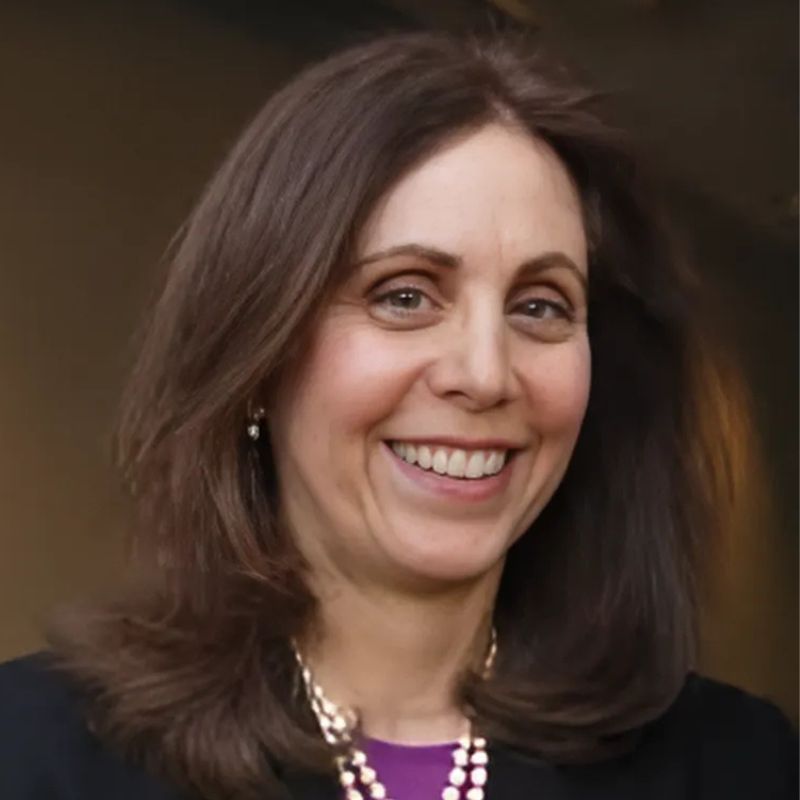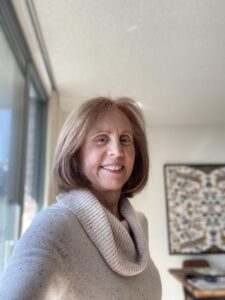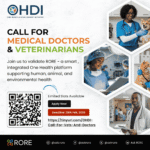
Meet Dr. Laura Kahn, our inspiring One Health personality of the month!
Dr. Kahn, a physician and public health expert, has dedicated her career to advancing the One Health movement. With an impressive background spanning nursing, medicine, public health, and public policy, she co-founded the One Health Initiative to bridge gaps between human, animal, and environmental health professionals. As an author, Dr. Laura Kahn has published several influential books, including her latest release, One Health and the Politics of COVID-19, which delves into the pandemic’s scientific, historical, and political dimensions. In this insightful interview with OHDI, Dr. Kahn shares her inspiring journey.
Dr. Kahn, you’ve had an impressive career spanning medicine, public policy, and One Health. Can you share your journey and how you became involved in the One Health movement?
My interests are broad, and I have always preferred preventing diseases to treating them. Transitioning from medicine and public health into public policy was a natural progression. I have always been interested in animal health and, at one time, had seriously thought about becoming a veterinarian. My biodefense policy research led me to the One Health concept because zoonotic pathogens don’t necessarily see a distinction between humans and other animals. Yet we create arbitrary divisions between medicine, veterinary medicine and environmental health. The One Health concept makes intuitive sense.
Tell us what inspired the establishment of the One Health Initiative and how the initial idea evolved into the global movement it is today.
My policy research led me to conclude that physicians and veterinarians rarely, if ever, communicated or collaborated with each other. This split created a serious problem because zoonotic pathogens infect across species, including humans. In 2006, I published my research findings in an article titled “Confronting Zoonoses, Linking Human and Veterinary Medicine” in the CDC’s journal Emerging Infectious Diseases. I got a huge response from veterinarians but virtually no response from physicians. This saddened but didn’t surprise me. Dr. Bruce Kaplan, a retired veterinarian, contacted me and suggested that we work together to show that a veterinarian and a physician could work together. So we joined forces. One year later, I contacted Dr. Tom Monath, a distinguished physician-virologist, after getting his card at a biodefense conference. He supported our efforts and joined our team. We were the founding core of the One Health Initiative. Dr. Monath has many distinguished colleagues around the world, and he contacted many of them to tell them about the One Health concept. He also suggested that we have a website, so on October 1, 2008, the One Health Initiative website was born. Dr. Kaplan became the webmaster. We worked collaboratively and tirelessly to spread the word about the One Health concept. Drs. Jack Woodall and Lisa Conti joined us soon afterwards.
What were the key challenges you faced, and how did you overcome them to build a collaborative effort across health sectors?
The key challenges continue. The veterinary profession has been the primary driving force advocating for the One Health concept. Public health is beginning to have interest. Unfortunately, medicine continues its lack of interest. Funding and organizations remain siloed. So, while the One Health concept seems simple and straightforward, implementing it remains more aspirational than operational.

Your soon-to-be-launched book, One Health and the Politics of COVID-19, takes an in-depth look at coronaviruses through a One Health framework. What motivated you to focus on the historical, scientific, and political aspects of the pandemic?
My book, One Health and the Politics of Covid-19, was published in early October 2024. I used a One Health framework to examine coronaviruses in general and SARS-CoV-1, MERS-CoV, and SARS-CoV-2 in particular. In its original iteration, it was going to include the political aspects of the public health response. I will be writing about those aspects of the pandemic in my next book, which I will begin writing shortly. The book that was just published focuses on the history, science, clinical, and molecular characteristics of coronaviruses. It also examines the politics of biosafety, biosecurity, and bioethics of gain-of-function research on pandemic potential pathogens. This is a highly political issue because many in the scientific community refuse to consider the possibility that SARS-CoV-2 leaked from a laboratory. However, my research found no evidence of a natural spillover event and plenty of circumstantial evidence for a lab leak. We absolutely must investigate the origins of SARS-CoV-2 to develop effective policies to prevent this catastrophe from happening again.
Pandemic preparedness is a recurring theme in your work. How can adopting a One Health perspective improve global readiness for future pandemics?
Improving communication and collaboration between human and veterinary medicine professionals should, in theory, provide early warning about the natural emergence of a zoonotic outbreak, facilitating a rapid response. In practice, it appears to be easier said than done. Public health surveillance of humans is a challenge. Surveillance of the wildlife-livestock interface is much harder. The occupational health surveillance of animal workers is even harder, as evidenced by the difficulties in containing highly pathogenic avian influenza H5N1, which continues to spread from animals to people. In addition, many new high-containment laboratories are being built around the world. Since no laboratory is infallible to human error, we risk having laboratory-acquired infections spread into populations. One Health must be prepared to handle both scenarios. We have a long way to go to achieve global readiness against future pandemics.
Your book discusses how public trust in science and health systems eroded during the pandemic. What can One Health advocates do to restore and strengthen this trust?
Public trust is essential for effective pandemic responses. If the public doesn’t trust you or your recommended policies, then your response efforts will be for naught. Honest and transparent leadership and communication are needed to restore public trust. Trust in government is at an all-time low because leaders were not honest or transparent during Covid-19. One of the hardest things for a leader to do is to admit uncertainty. It’s much better to state, “We don’t know” or, We don’t have the answers now,” than to give false reassurances that everything is fine. What’s worse is giving conflicting advice. The situation with Covid-19 was disastrous. If honest leaders with integrity were in charge of government, then there would be a chance to rebuild public trust. Otherwise, public trust will be lost for a very long time.
You’ve strongly advocated for tackling antimicrobial resistance (AMR), a significant global health threat. In your experience, what key strategies have proven the most effective in combating AMR?
AMR continues to threaten the practice of modern medicine. Reducing the unnecessary use of antibiotics in medicine and agriculture is an important first step. The environmental and ecosystem components of AMR have been left out of the equation. Resistance genes are ancient and everywhere around the world. Our excessive use of antibiotics has changed the planet’s microbiome in ways that we don’t fully understand. Also, with over 8 billion humans and approximately 30 billion domesticated animals, we produce approximately 4 trillion kilograms of fecal waste that contaminates environments and ecosystems, polluting waterways and causing foodborne and waterborne illnesses. Countries without sanitation systems suffer higher rates of illness and antibiotic use, leading to worsening AMR. There are no sanitation systems for animals. Their wastes create enormous health hazards, yet they are ignored. This is a serious global health challenge that’s only going to get worse. We must address human and animal fecal wastes for a sustainable future.

One of the major highlights of the book is the limitations of government disease surveillance systems, focusing primarily on humans and food-producing animals. Why do you believe it is crucial to expand disease surveillance to include companion animals and wildlife, and how will this improve global health outcomes?
In my book, One Health and the Politics of Antimicrobial Resistance, I found some studies indicating that companion animals might be playing a role in spreading AMR. Wildlife, particularly birds, also play a role in spreading AMR. In my most recent book, I found in the veterinary medical literature that coronaviruses infect many species, including wildlife and companion animals. We share this planet and microbes with other species. We’re all connected. We should, therefore, have a better idea of where these microbes originate and how they spread.
Most importantly, we should not manipulate these microbes in laboratories to make them more transmissible or deadly. Gain-of-function research on pandemic potential pathogens is unethical and immoral. The risks far outweigh the benefits. This type of research is too dangerous and should be banned globally.
What advice would you give emerging researchers and policymakers who wish to contribute to the One Health movement?
One Health is a broad concept that facilitates the recognition of connections across different disciplines. Today, education stresses the importance of specialization, which has benefits, but if everyone specializes, then no one sees the forest through the trees. We need generalists who can assess broad trends and connections. We need people who can see the forests. One Health education and training require expansive, analytic, and creative thinking to address the complex challenges that we face in the decades ahead. Everyone has a responsibility and obligation to leave the world in better shape for future generations.

When you are not working on advancing One Health initiatives, how do you like to unwind and relax?
I like to take long walks in nature. It helps me think. I also like to travel and learn about different cultures and history. I am a big movie buff and enjoy watching different genres. When I’m not writing about One Health, I enjoy creative writing and have written a science fiction novella about One Health.





